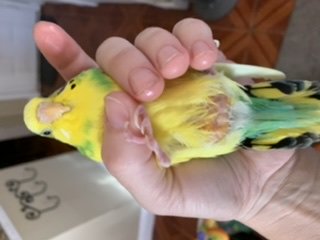Pet Parakeet Budgy has a Swollen Abdomen and Feathers Will Not Grow Back
by Jenn
(Orlando Florida )
My Pet parakeet Budgy has a swollen abdomen and feathers won’t grow back but behaves okay and eats ok. Just has a weird bald patch on the butt.
Not sure what or why it happened. We thought it was trying to lay a egg but its swollen area came and went. Now it has been a month or two (no vets locally will take a bird pet !! I’m so frustrated)
Editor Suggestion
\Hi Jenn,
I'm sorry to hear about your pet parakeet's health issues. It's concerning to hear that your bird has a swollen abdomen and bald patches on its body. These symptoms could be signs of an underlying medical condition that requires veterinary attention.
According to Bird Sphere, mineral deficiencies, excessive heating, and stress can delay the regrowth of feathers after molting. Sometimes loss of feathers is due to a correctable thyroid condition. It’s never normal for a parakeet to have bald areas persisting anywhere on its body. Feathers should grow back within five to 10 weeks after molting.
It’s important to take your pet to a vet as soon as possible. However, if you are unable to find a vet locally who will take a bird pet, you can try contacting The Association of Avian Veterinarians for help in finding a vet near you who can help your pet.
If there are no avian veterinarians in your area, you may want to consider reaching out to a bird rescue or rehabilitation center in your region for advice or referrals. Alternatively, you can also try contacting a remote veterinarian who specializes in avian medicine. You can try contacting The Association of Avian Veterinarians for help in finding a vet near you who can help your pet.
There is also an online service where you can chat with an avian veterinarian. Vets are usually available 24 hours a day.
Without a proper diagnosis and treatment, your pet's condition may worsen over time. In the meantime, you can try to make your bird more comfortable by providing a warm and quiet place to rest, a balanced diet, and plenty of clean water. You should also monitor your bird's behavior and keep a record of any changes or new symptoms that develop.
Keep us up to date.
Best,
Jeff
Editor and Publisher
Cool Small Pets
Like this page? Please share it with your friends:

